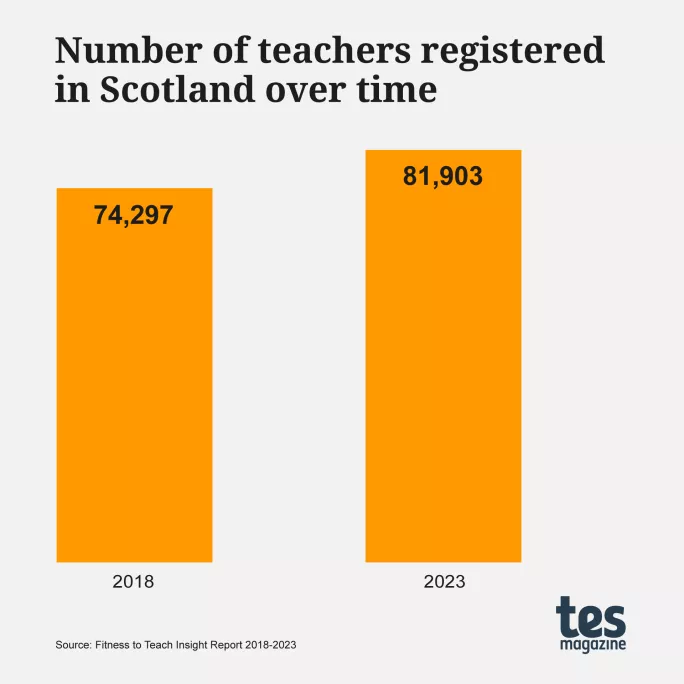Fitness to teach cases in Scotland hit 10-year high

The number of teachers being investigated by Scotland’s teaching watchdog has hit its highest level in more than 10 years.
The General Teaching Council for Scotland (GTCS) - which investigates concerns about teachers’ conduct or professional competence - has revealed it started 2022-23 with 237 open “fitness to teach” cases, up significantly from 180 in 2021-22 and 164 in 2020-21.
A GTCS report published today analysing data from more than 1,000 fitness to teach cases, states: “This represents the highest open caseload for us in more than 10 years.”
However, the GTCS stresses the number of teachers who have concerns raised about them remains small at less than 0.3 per cent of teachers each year - which equates to around 200 people.
It also says the number removed from, or refused entry to, teaching in Scotland over conduct or competence concerns is even smaller - an average of 25 people each year.
Peak in fitness to teach caseload
On 31 March 2023, there were 81,903 teachers on the teaching register in Scotland - “the highest level it has been in more than 10 years”, according to the report - and an increase of more than 7,500 on 31 March 2018 when there were 74,297 teachers on the register.

The GTCS says the peak in its fitness to teach caseload has come about, in part, because of the pandemic, which made it harder to process cases.
It says in 2020 and 2021 schools understandably found it harder to release teachers to take part in GTCS processes “whether as witnesses or panel members”; ill health also “impacted availability and release” of teachers.
- Also today: 6 things we did to improve mental health in our school
- Exclusive: Secondaries ‘starting again’ as pupils lack ‘common knowledge base’
- Related: Scotland’s General Teaching Council has first BAME convener
The time taken to obtain information from the likes of Police Scotland has also been a barrier to progressing cases; the GTCS has taken legal action “to address some of these challenges”, it says.
The GTCS also says it has seen an increase in referrals, which can come from anyone with a concern about a teacher.
In total, there were 196 referrals made about teachers in 2022-23 - with “referral spikes” in 2019-20 (228 referrals received) and 2021-22 (230 referrals received).
This compares to 160 referrals made in 2016-17.
‘No single explanation’ for increase in referrals
The GTCS says there is “no single explanation” for the increase in referrals - but that referrals from the public often “relate to matters that we are not able to consider through our fitness to teach process”.
“Commonly the concerns are about the education service that is being provided, rather than the conduct of an individual teacher,” says the report.
The GTCS received 275 referrals from members of the public between 1 April 2018 and 31 March 2023 and took forward 26 per cent of them.
Referrals from employers are much more likely to be progressed - over the same period 305 referrals were received from employers and the GTCS took forward 92 per cent of them.
However, the GTCS is critical of the “wide variability in the investigative practice of employers across different types of cases”.
It says that “there is a particular challenge in ensuring there is the resource, knowledge and experience within employers to carry out these processes with neutrality and an understanding of best legal investigative practice”.
“Continuity of resource and records management are other challenges we have observed,” the report adds.
Important to alert GTCS to concerns at ‘early stage’
Launching the report, Jennifer Macdonald, a strategic director at the GTCS, said the “overwhelming majority” of teachers are fit to teach and that the GTCS is committed to reducing the time cases take “in the interests of everyone involved”.
Ms Macdonald urged teachers to engage with GTCS at “an early stage” if concerns are raised.
She said: “If we are satisfied that a person has insight into the reasons for and/or impact of their actions and has taken steps to address them since concerns arose, we can be more confident it will not happen again or pose a future risk to the public.
“This helps us to ensure we are focusing on the cases we should, as a professional regulator, so we can conclude cases sooner.”
For the latest Scottish education news, analysis and features delivered directly to your inbox, sign up to Tes magazine’s The Week in Scotland newsletter
Keep reading for just £1 per month
You've reached your limit of free articles this month. Subscribe for £1 per month for three months and get:
- Unlimited access to all Tes magazine content
- Exclusive subscriber-only stories
- Award-winning email newsletters
topics in this article



